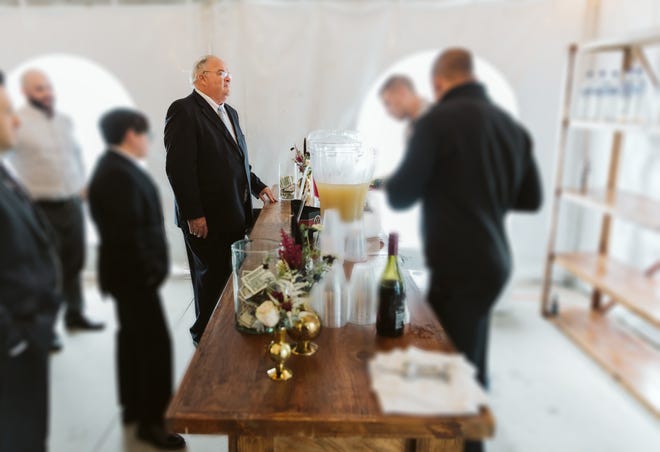
Standing before the two brides, Billy Long turned to his wife and told her he needed to leave. Then the U.S. Representative walked out of the same-sex wedding shower his family was co-hosting.
That’s how Ellen Neville-Verdugo remembers the day meant to celebrate her and her wife’s engagement.
“It was humiliating,” Neville-Verdugo told the News-Leader.
“That someone would literally run away rather than be in a picture with you. These pictures were only for our memories. They were just for us and our family to look at years down the road and for him to automatically assume that the ‘wrong people’ were going to know he was at a same-sex wedding shower and knew gay people and that that was so abhorrent. It was just really hurtful and humiliating.”
Long was disinvited from the wedding. But a few days later, he invited Neville-Verdugo and her fiancée to lunch where she thought he meant to apologize. But instead Long explained he had left the shower for their benefit — to save them from the “embarrassment” of having pictures with him.
“I thought it was a very convenient way to excuse his behavior, but I did not believe it at all,” Neville-Verdugo said.
Long did not want to “get in any trouble” with his family, she recalled him saying. And after much thought, Neville-Verdugo agreed to re-invite him for the sake of his family.
Growing up as family friends with the Longs, she is around the same age as Billy Long’s daughters and spent a good deal of time with the family as a child.
“They’re very, very sweet,” she said of Long’s wife and children. In her mind, the congressman and his family are “two very separate entities.”
“The three of them are very, very kind. They’re very kind to both my wife and I and seemed supportive of our engagement,” Neville-Verdugo told the News-Leader. “The only reason I ever agreed to let him come to the wedding was because I valued my family’s relationship with his wife and daughters. And I did not want to see them get hurt.”
More:Billy Long votes against same-sex marriage protections; Vicky Hartzler does not vote
On Oct. 13 in 2018, Long attended the wedding without incident. And that is a secret Neville-Verdugo kept until last month when Billy Long voted against her right to be married to her wife.
While most similar incidents don’t involve the complexities of a sitting congressman’s political calculations, friends and family across the Ozarks often struggle at the intersection of long-standing moral conviction and the deeply-felt identity of a loved one.

Politics and marriage equality
A Springfield auctioneer and Republican, Long has represented southwest Missouri in Congress since the ‘Tea Party’ Republican wave election of 2010. But that tenure will soon come to an end.
Long’s bid to succeed Roy Blunt in the U.S. Senate ended in August — he finished election night with just 4.8 percent of the vote in the Republican primary. Unable to run for re-election in the House while running for Senate, he’ll be replaced in the deep red congressional district, likely by Republican nominee Eric Burlison.
Perhaps his biggest political claim-to-fame, often cited in his ill-fated Senate campaign, was his early onboarding of the “Trump Train” — being one of the first congressional Republicans to endorse former President Donald Trump in his maiden 2016 campaign.
In Congress, Long made a name as a diehard conservative with a bombastic personality he often takes to Twitter, predicting the Trumpian style of political insults and name-calling. But hailing from the Bible Belt — deep within the heart of evangelical America — Long often placed his political and legislative focus on a social conservatism meant to appeal to his fundamentalist base.
To many of those voters, there are few political issues more important than maintaining the biblical standards of traditional marriage. During Long’s time in Congress, support for same-sex marriage skyrocketed across the country. But marriage equality remains deeply divisive in the Ozarks even years after the Supreme Court legalized gay marriage nationwide.
That landmark case, Obergefell v. Hodges, held in 2015 that same-sex couples could not be denied marriage due to an individual’s fundamental right to privacy in their own affairs.
Speaking to the News-Leader that year, Billy Long decried the ruling as federal overreach on an issue that should be decided at the state level.
“I am disappointed the Supreme Court has ruled to uphold same-sex marriage. This decision is troubling as it will overturn voter-imposed state bans on the practice, such as in Missouri,” Long said, referencing a 2004 referendum in which 71 percent of Missourians voted against marriage equality.
“I believe this decision directly removes and marginalizes the will of the people. It undermines the very democratic principle America is founded upon and deprives states of their Tenth Amendment rights. I join many southwest Missourians in expressing frustration with the Court’s judgment, as it violates the traditional meaning of marriage,” he told the News-Leader.
More:Teachers at Springfield’s largest high school, Kickapoo, told to remove Pride flags
Almost two decades after that 2004 vote, a slim majority of Missourians now support same-sex marriage (despite the state lagging the national rate by at least ten percentage points). A 2022 Gallop poll found 71 percent of Americans nationwide support marriage equality — the only studied subgroup still in opposition being weekly churchgoers.
Still, to this day Missouri statute forbids recognition of same-sex marriages, even as that code is now unenforceable.
The right to privacy had previously been established in the 14th Amendment of the Constitution by other court cases guaranteeing rights to contraceptives, same-sex intercourse and abortion, among others.
That constitutional right to privacy was put in jeopardy earlier this year when the Supreme Court overturned Roe v. Wade and allowed individual states to ban abortion. While the majority ruling explicitly states their ruling will not affect other privacy rights precedents, many analysts say the same reasoning could apply to other rulings, including same-sex marriage rights.
In an opinion concurrent with the majority, Justice Clarence Thomas invited lawsuits to challenge Obergefell and other rulings on the grounds that privacy is no longer a Constitutional right.
“In future cases, we should reconsider all of this Court’s substantive due process precedents, including … Obergefell,” Thomas wrote. “Because any substantive due process decision is ‘demonstrably erroneous,’ we have a duty to ‘correct the error’ established in those precedents.”
In reaction to this suggestion, Congressional Democrats moved to approve a new law guaranteeing same-sex marriage rights even if the Supreme Court removes that right from the Constitution. On July 19, the U.S. House voted 257-157 to approve the Respect for Marriage Act. Ultimate passage of the bill remains undecided in the U.S. Senate.
Of the 211 Republicans in the House, only 47 voted to codify same-sex marriage rights. Missouri’s Long was not among them. In fact, he taunted fellow Rep. Vicky Hartzler on Twitter for missing the vote amid the final stretch of the U.S. Senate campaign they both went on to lose.
“Rough & tough candidate @RepHartzler says she’s a ‘fighter’ but she didn’t have enough fight in her or courage to vote yea or nay. The courage of a #TransRINO,” he said of her absence for the marriage equality vote.
“You want to love and support … but it can be very difficult”
Regardless of Long’s reasons for his quick exit, the incident at Neville-Verdugo’s shower is likely familiar to many in the Ozarks — where religious and moral positions often put LGBTQ people in conflict with their loved ones.
“It’s a challenge for a lot of people in the community,” PFLAG Springfield President Aaron Schekorra told the News-Leader. “You’ve held these values that are at the basis of your religion or from somewhere else for so long and a child or another loved one in your life is coming into conflict with those values — you want to love and support that family member or that child. But it can be very difficult to do that.”
Springfield is known for its strong evangelical tradition, which often precludes acceptance of practices like same-sex marriage.
More:‘We lost people’: LGBTQ community grapples with last decade’s SOGI fight while wondering what’s next
Such values cause strain on queer individuals seeking acceptance from religious family members. But estrangement also puts those family members in a difficult position where they must choose between their child or loved one and their faith.
“It is very difficult for the believer because we know what’s at stake — we’re looking at this from the view of eternity,” Evangelist Chris Peltz told the News-Leader.
Peltz preaches for Southside Church of Christ, a nondenominational Springfield church which believes homosexuality is a sin.
He calls followers of the church to be “gentle and kind” but never “compromise the Word of God.”
“To compromise would be to say, ‘it’s family’ or ‘I don’t want to say anything because it would destroy this relationship.’ But if we compromise with God’s word, we’re destroying our relationship with God. So we need to be firm with the truth,” he said.
Many churches in Springfield and beyond preach a similar message about homosexuality or other actions the church considers sins. That can contribute to estrangement, with each side believing they are doing the right thing.
As difficult as it is for a queer person, it is also difficult for a parent or other relative who may refuse to attend their child’s same-sex wedding out of religious obligation.
“It is sad, it’s disheartening. It’s troubling. And it’s — it can be very depressing because you’re not looking at this as someone who is involved in what many would categorize as some type of heinous sin as much as you’re looking at a loved one who is rejecting our creator, our God,” Peltz said.
Both Peltz and Schekorra said they council others to approach these difficult situations with empathy and to attempt to understand what the other believes.
“Approach your loved ones with as much empathy as possible. Likely that queer person has also grown up in the same faith experience as their parents and leaning on that and finding that common ground can make all the difference,” Schekorra said.
“For someone who’s struggling with identity, try to find out where they’re at or what they want and what they desire. The first step would be to listen, let them know that first of all, they’re loved. They’re loved by us, and they’re loved by God,” Peltz said.
Schekorra also emphasized that a queer person should not initiate such a conversation if they fear their safety or well-being could be at risk.
He encouraged family members with questions to get in touch with PFLAG Springfield, a group focused on fostering the bonds between queer people and their family or loved ones — offering peer-to-peer support and a monthly support group for parents of those in the community.
“It’s a place where they can ask the right questions, but maybe not in the right way,” Schekorra told the News-Leader.
Why did Ellen Neville-Verdugo come forward?

Neville-Verdugo did not consider speaking publicly about Billy Long’s attendance at her wedding until his vote against the Respect for Marriage Act codifying same-sex marriage. In the days after his vote, she posted about her experience on social media and submitted a letter to the Kansas City Star.
“Rep. Billy Long recently said, ‘I act the same when somebody is watching or somebody is not watching.’ Days later, the U.S. Senate candidate and my family ‘friend’ of 20-plus years voted against protecting my family’s right to marriage with the Respect for Marriage Act,” she wrote in the letter.
Speaking to the News-Leader, she said his vote against her marriage was the “final straw” freeing her from keeping his secret.
“157 Republicans voted against protecting same sex marriage. That’s a huge number. And one of those was someone that I know personally,” she said. “And I knew that he would be on that list, but part of me was hoping that because he knows me, because he knows my family — when I looked up the list of how the Congress people voted that day, part of me was hoping to see that he voted on the right side of history, but I knew that he wouldn’t.”
Neville-Verdugo said her primary concern about speaking publicly was the potential effect on Long’s wife and children, who she believes did not know the representative had initially been disinvited from the wedding until this month.
In the congressman’s 12 years in office, Neville-Verdugo says she’s reached out to Long through official channels several times about policy disagreements. Before speaking publicly about her wedding, she reached out to him and his family personally. She did not receive a response then or since she began speaking publicly.
Staff in Representative Long’s D.C. office also did not respond to requests for comment from the Springfield News-Leader.
Neville-Verdugo said she is a Democrat but maintains she did not come forward for any kind of partisan advantage. Long only has a few months left in Congress and she did not believe her story would have any impact on his U.S. Senate campaign.
Instead, she hopes to use her story as a platform to express the “terror” she experiences when thinking of the future — a future that could see the Supreme Court strip away her marriage within a few years.
“If that happened, it would probably be the worst day of our lives, and nothing is more important to me than my family,” she said.
“I’ll do anything to protect my family. And my wife is my family so it’s just hard to even think about because I’m just so scared. … People really want to keep us from being married. People in this community want us to be torn apart from each other.”
More:Missouri House passes two bills aiming to ban transgender athletes, Senate debates a third
It is unclear what would happen in states like Missouri if same-sex marriage rights were nationally overturned in a hypothetical Supreme Court case. Missouri could revert to denying legitimacy to such unions. Or it might not. Currently married same-sex couples could be ‘grandfathered in’ and retain their marriage license. Or they might not.
That uncertainty leaves married queer people living in socially conservative states with a terrible choice — leave the home they love or risk losing their marriage with the person they love.
Neville-Verdugo and her wife grew up in Springfield. They both moved away for a time and moved back to the city to start a life together. They hope to adopt a child in the near future and raise their family in Springfield. But they are frozen by indecision because of the possibilities the future could hold.
“I hope I get to raise my family in Springfield, where my family and my friends are. I don’t want to leave. But if Missouri doesn’t recognize my marriage, then I feel like I would have no choice but to go somewhere else where we can be who we are.”
Andrew Sullender is the local government reporter for the Springfield News-Leader. Follow him on Twitter @andrewsullender. Email tips and story ideas to asullender@gannett.com.








